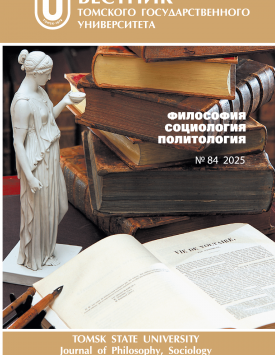Social analysis and actions for Ghanaian women’s development within Bosore and Abirem communities: a project study
Представлены результаты исследования, основанного на теории потенциальных возможностей и анализе полевых данных о повседневном опыте женщин сельских общин Босоре и Абирем (Гана). Подчеркнута необходимость применения государственными и частными организациями комплексного подхода при условии активного участия членов сообщества к устранению коренных причин бесправия женщин Ганы. Автор заявляет об отсутствии конфликта интересов.
Ключевые слова
Гана,
подход, основанный на возможностях,
социальные действия,
социальный анализ,
развитие женщинАвторы
| Энчилл Габриэлла Лили | Национальный исследовательский университет «Высшая школа экономики» | бакалавр искусств по направлению «Комплексное развитие сообществ», магистр наук по направлению «Население и развитие» Международной лаборатории исследований социальной интеграции, аспирант по направлению «Социология», научный сотрудник аспирантуры по социологии | genchill@hse.ru |
Всего: 1
Ссылки
Mikell, G. (1992) Culture, law, and social policy: Changing the economic status of Ghanaian women. Yale Journal of International Law. 17. p. 225.
Bryan, A. (2023) The material conditions of non-domination: Property, independence, and the means of production. European Journal of Political Theory. 22(3). pp. 425-444.
Gerson, S. (2024) Affiliation vs. Alienation. Psychoanalytic Dialogues. 34(3). pp. 280-287.
Whitaker, J. (2023) What is play? In: Whitaker, J. & Tonkin, A. Play and Health in Childhood. Routledge. pp. 17-31.
Feingold, A. (1994) Gender differences in personality: a meta-analysis. Psychological Bulletin. 11(3). p. 429.
Zinkin, M. (2021) Reason, systematicity and judgment. The Court of Reason. Proc. of the 13th International Kant Congress. Vol. 134. pp. 833-840.
Feldman, R. (2022) The neurobiology of affiliation; maternal-infant bonding to life within social groups. In: Della Sala, S. (ed.) Encyclopedia of Behavioral Neuroscience. 2nd ed. Elsevier. pp. 518-531.
Huta, V. (2005) Pursuing pleasure versus growth and excellence: Links with different aspects of well-being. Dr. Diss. Montreal: McGill University. pp. 80-89.
Plagerson, S. (2021) Human Well-Being and Capabilities. UNRISD. pp. 2-17.
DeJong, J. (2013) Capabilities, reproductive health and well-being. In: Hulme, D. & Toye, J. (eds) Understanding Poverty and Well-Being. Routledge. pp. 74-95.
Raj, A., Singh, A., Silverman, J.G., Bhan, N., Barker, K.M. & McDougal, L. (2022) Freedom of movement and adolescent sexual violence in India. Journal of Interpersonal Violence. 37(1-2). pp. NP925-943.
Donatelli, P. (2024)Martha Nussbaum. STUDI E SAGGI. pp. 1055-1061.
Sisto, R. (2023) Crucial factors affecting longevity. The Lancet Healthy Longevity. 4(10). pp. e518-519.
Ghana Statistical Service. (2014) 2010 population and housing census. District Analytical Report. Kwabre East District. pp. 15-38.
Ministry of Trade and Industry of Ghana. (2021) [One District One Factory: District endowment of Kwabre East]. National Development Planning Commission Publication. pp. 58-91.
Nussbaum, M.C. (2000) Women and Human Development: The Capabilities Approach. Cambridge University Press. pp. 78-81.
Sen, A. (1999) Development as Freedom. Alfred Knopf, p. 3.
O’Neil, J. (2022) Varieties of unfreedom. In: Sanghera, B. & Calder, G. (eds) Ethics, Economy and Social Science. Routledge. pp. 153-174.
Mondal, A. (2022) Gender equality and women’s empowerment: The foundation stones of sustainability.International Journal of Home Science. 8(2). pp. 76-79.
Bitto, A. (2015) SDGs and the dawning of a new globally empowered era of women’s health and wellbeing research & reviews. Journal of Medical and Health Sciences. 4(4). pp. 66-75.
Sen, A. (1985) Commodities and Capabilities. North Holland. p. 130.
Amadiume, I. (2015) Male Daughters, Female Husbands: Gender and Sex in an African Society. Zed Books Ltd. p. 173.
UNDP. (2016) Africa human development report 2016 accelerating gender equality and women's empowerment in Africa. United Nations Development Programme, Africa, No. 267638.
Altuzarra, A., Galvez-Galvez, C. & Gonzalez-Flores, A. (2021) Is gender inequality a barrier to economic growth? A panel data analysis of developing countries. Sustainability.13(1). 367. DOI: 10.3390/su13010367.
Ahinkorah, B.O., Hagan, J.E.Jr., Ameyaw, E.K., Seidu, A.A. & Schack, T. (2021) COVID-19 pandemic worsening gender inequalities for women and girls in Sub-Saharan Africa. Frontiers in Global Women's Health. 2. p. 686984. DOI: 10.3389/fgwh.2021.686984.
Amu, N.J. (2005) The Role of Women in Ghana's Economy. Accra: Friedrich Ebert Foundation. pp. 1-62.


 Вы можете добавить статью
Вы можете добавить статью